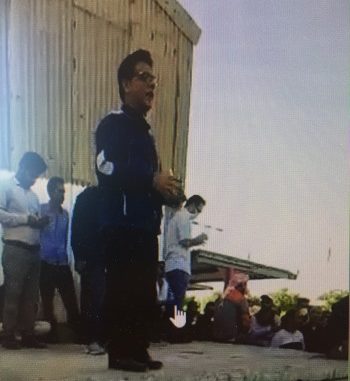
Since 14 June, workers at the Haft Tappeh sugar cane factory, near the Iranian city of Shush in oil-rich Khuzestan Province, have again taken strike action. Led by their independent trade union, the workers carried out their last big wave of strikes at the end of 2018.
During that strike, Esmail Bakhshi, one of their leaders, was arrested and then tortured by the Revolutionary Guards while he was in prison. This was after he had said that “workers no longer allow the private sector to control the company, and if the government wants to take over all the company’s business it must be managed by the workers’ council and based on collective decision-making.”
The Haft Tappeh workers’ experience after its 2015 privatisation was brutal. Their numbers were slashed from 7,000 to 4,000. Videos of the 2018 strike showed workers chanting, “Bread, jobs, freedom, council management”. These demands were not only a direct attack on the regime but also on pro-capitalist opposition forces.
During the 2018 strike, workers fought for their wages, some of which had not been paid for months. Now the immediate payment of all unpaid wages is again one of the central demands, along with a new one on the question of workers’ insurance. In order to avoid fraud in the payment of wages and withholding of social security, it is necessary that the company’s books are opened and the company’s profits are confiscated and placed under democratic control and management of the workers.
The other demands in the current strike are:
- Reinstate all sacked workers, including Esmail Bakhshi and Ali Nijati, who were both dismissed because of their trade union activities.
- Arrest Asadbeigi (CEO) and sentence Asadbeigi and Rostami (Chairman of its Board) to life imprisonment.
- Get rid of the fraudster employer and the private sector.
- Return of all embezzled wealth to the workers.
While all these demands are important, if Haft Tappeh was under democratic control and administration of the workers, as was raised in the 2018 strike, threats such as dismissals by the Iranian regime and the capitalists it represents, could be more easily countered.
Understandably the strikers demand the jailing of the company’s CEO and the Chairman of its Board. However, the regime’s courts cannot be relied upon. It is not accidental that they imprison and allow the torture of trade unionists. Basically these courts represent the interests of the regime and Iranian capitalists; even if these two were jailed it would not solve the basic problems the workers face.
The demands to get rid of fraudulent bosses and the whole private sector show how far the consciousness of the Haft Tappeh workers has already developed. The calls for management by the workers’ council, based on collective decision-making, should be concretized, demanding that the key parts of the private sector should be nationalized under democratic control and administration.
Since 2017 there have been repeated workers’ struggles in Iran and signs of the development of an independent workers’ movement. The Haft Tappeh workers have played an important role in this and their struggles need to be supported.
Please send solidarity messages to:
